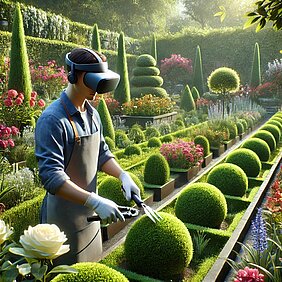Immersive Swarm Grammar Gardening
03/08/2025In this project, the reactive nature of Swarm Grammars is taken to the next level as they are become the focus of an immersive virtual reality gardening simulation.
Background
Swarm Grammars (SGs) are an agent-based approach to generating complex geometric structures considering spatiotemporal constraints and deploying numerous agent abilities inspired by biological organisms, e.g. near-field sensing, migration, reproduction,and differentiation, that are held together by reactive behaviour definitions. In this project, the reactive nature of SGs is taken to the next level as they are become the focus of an immersive virtual reality gardening simulation.
Tasks
Implement a simple SG-based plant model, configure it to yield attractive plant-like structures, and make it the foundation of a virtual reality gardening simulation. Conceptualise and implement different means to interact with the plans: Plant seeds, water the seedlings and plants, spread out fertiliser, setup scaffolding structures or different articificial lights, trim the plants, cross-breed them,... Whichever direction your interaction set takes, make sure you provide a well-thought out rationale to support your decisions. Based on your rationale, concept and implementation, propose a scientific validation approach early on that can be pursued to complete your scientific project.
Literatur
[1] Mußmann, Marc, Daniel Nicolas Hofstadler, and Sebastian von Mammen. "An Agent-based, Interactive Simulation Model of Root Growth." Artificial Life Conference Proceedings 36. Vol. 2024. No. 1. One Rogers Street, Cambridge, MA 02142-1209, USA journals-info@ mit. edu: MIT Press, 2024. [2] von Mammen, Sebastian, and Christian Jacob. "Genetic swarm grammar programming: Ecological breeding like a gardener." 2007 IEEE Congress on Evolutionary Computation. IEEE, 2007. [3] von Mammen, Sebastian, et al. "Interactive simulations of biohybrid systems." Frontiers in Robotics and AI 4 (2017): 50.







